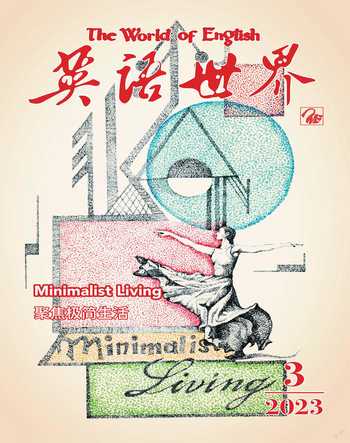Nice“兔” Meet U
2023-05-30李绍青
李绍青
金虎归山去,玉兔迎春来。2023年是中国农历兔年,人们喜欢“谈兔”(坦途),希望“钱”“兔”无量,渴望大展宏“兔”。
一、属相“兔”的英译
英语中的兔子有rabbit、bunny、hare三种“同素异形体”,其含义各不相同。rabbit为家兔,hare通常指野兔,bunny往往是儿童用语。bunny还可指“兔女郎”(bunny girl—night-club hostess, esp. one wearing a costume that includes false rabbits ears and a tail即夜总会的女招待,尤指以假的兔子耳朵及尾巴为装饰者)。
在中国文化中,兔子总跟“胆小、温顺、乖巧、善良”联系在一起,属兔的人处事谨慎、性格温柔、乐于助人、颇富同情心。因此,它的英译必须具备同样的感情色彩。
三兔鼎立(rabbit、bunny、hare)中,我们首先排除含性别偏见的bunny,再来推敲究竟应该是hare还是rabbit。
英汉双解词典上,二者的释义分别为:
hare—an animal like a rabbit but larger, that can run very quickly(野兔)
rabbit—a common small animal with long ears and soft fur, that lives in a hole in the ground(家兔)
hare有timid、crazy、stupid、sly等贬义,在英国俚语中还指“无票乘车的旅客”。例如:as mad as a March hare 疯癫或犯傻;hare-brain 痴呆或愚蠢之人;make a hare of sb 愚弄某人;seek a hare in a hens nest 缘木求鱼;scared like/as a hare 吓得要命。
rabbit有“不擅长(某项运动的人)”“好奇”“唠叨”等词义。例如:
Im just a rabbit at tennis.我不擅长打网球。
The old lady has rabbit ears.那个老太太爱打听闲事。
No matter what peoples reaction is, she just rabbits on.不管别人有什么反应,她只是说个不停。
Each time they asked him a question, he was like a rabbit caught in the headlights. 每次他们问他什么问题,他就像受了惊吓的兔子一般呆立在那儿。
然而,rabbit一般并无贬义,甚至有褒义,如the Easter Rabbit(美国)复活兔、rabbit foot兔子的后足(幸运的护符,提起兔子后脚可带来好运)。
显然,属相“兔”的最佳对应是rabbit。
“你属什么”(询问他人属相)可以说:What animal sign were you born under?
“我屬兔。”可以说:I was born in the Year of the Rabbit. / Mine is the Rabbit. / Rabbit is my zodiac sign.
“今年(2023)是兔年(我的本命年)。”可以说:Now, we are in the year 2023, the year of the rabbit (which is also my zodiac year).
二、“兔”的习语
1. bunny:booth bunny 促销女郎;dust bunny 积尘。
2. hare:hare-footed 移动很快的;harelip 兔唇;hare and hounds 狗追野兔游戏;hunt/run the wrong hare 估计错误,错怪某人;run with the hare and hunt with the hounds 两面讨好/耍两面派(含贬义);kiss the hares foot 迟到。
3. rabbit:rabbit ball 弹性极好的棒球;rabbit job 成批作业;rabbit warren 养兔场;兔窝式居民区(有许多狭小通道的建筑、街道狭窄而密集的城区);like rabbits in a warren 挤得水泄不通。
三、“兔”的谚语
A rabbit is never caught twice in the same place. 同一个错误不会犯两次。
Cows can catch no rabbits. 老牛追兔子:有劲使不上。
Even a rabbit will bite when it is cornered. 兔子急了也咬人。【与“Even a worm will turn.”异曲同工。】
First catch your hare (then cook him). 先抓兔子后烹调:勿谋之过早/不要过于乐观。【同义习语有“Dont count your chickens before they are hatched.”。】
Hares may pull dead lions by the beard. /Even rabbits insult a dead lion. 虎落平阳被犬欺。
He that will have a hare to breakfast must hunt overnight. 早餐想吃野兔肉,头晚捕兔熬一宿。
He who follows two hares is sure to catch neither. 追逐两只兔,两头都落空。
If you run after two hares, you will catch neither. 同时追两兔,一只也难捕。
The tail of a rabbit—cannot be long / wont last long. 兔子的尾巴——长不了。
四、“兔”的典故
1. as mad as a March hare 疯癫如三月的野兔
兔子本来很胆小,但3月交尾期则表现得十分疯狂,因为3月是野兔发情的季节。hare由于在交配期间行为怪异而被称为“发狂的兔子”。人们就以3月的野兔形容人的疯狂状态,比喻 mentally ill或 very silly,即“疯癫”或“犯傻”。此成语因英国作家刘易斯·卡罗尔(Lewis Carroll,1832—1898)在其作品《爱丽丝梦游仙境》(又译《爱丽丝漫游奇境》《爱丽丝奇境历险记》《爱丽丝奇遇记》)中塑造的角色 March Hare 而更加流行。
2. One beat the bush and another caught the hare/bird. 你打灌木丛,人家抓兔子/小鸟。
这是14世纪的谚语。过去贵族围猎鸟兽时,先由仆从去拨打可能藏有猎物的灌木丛,待猎物惊逃出来后再由主人射杀。此谚语意指某人付出了劳动,而果实却由别人享受,类似我们说的“为他人作嫁衣裳”。英国作家海伍德(John Heywood,1497—1580)编的《谚语集》(Proverbs,1546)收录了这种说法,并注解说,英王亨利五世在围攻奥尔良时曾说过:“Shall I beat the bush and another takes the bird?”
3. pull a rabbit out of a hat 拿出一个绝招来
源自魔术师常常变从帽子抓出兔子的戏法(Magicians often perform tricks such as pull a rabbit out of a hat)。
4. The tortoise wins the race while the hare is sleeping. 兔子打瞌睡,乌龟得第一。
出自《伊索寓言·龟兔赛跑》(The Hare and the Tortoise):兔子和乌龟赛跑,兔子自恃跑得快,赛跑途中看见乌龟远远落后于自己,竟然在一棵树下休息睡觉;乌龟虽然跑得慢,但坚持不懈,等到兔子醒来时,乌龟早已到达终点。这则寓言告诫人们,强者莫骄傲,弱者也莫气馁。人们也常用它来比喻通过不屈不挠、踏踏实实的工作去取得成功。“Slow and steady wins the race.”(慢而稳可获胜。)是从此寓言中引申出的一句箴言式谚语,VOA Special Ednglish网站将之作为广告语。
“兔”的中文俗语、成语英译
1. 俗语
(1)不见兔子不撒鹰。
直译:Dont send out your hawk until the hare is spotted.
意译:No target, no action. / Dont pull the trigger until you see the target.
(2)静如处子,动如脱兔。
直译:Be as quiet as a lamb and as fast as a hare.
意译:An army should keep as still and quiet as a virgin, and move as agile and fast as a rabbit. / An army shall be quick and nimble when it moves, and be silent and still when stationed.
(3)兔子不吃窝边草。
直译:A wise hare never nibbles the grass around his own burrow.
直译+注解:A hare never eats the grass by its own burrow—a villain doesnt harm his next-door neighbors.
意译:Dont harm your neighbors.
2. 成语
(1)守株待兔:出自《韩非子·五蠹》,比喻坐等意外收获,也指单凭狭隘经验。
Waiting for a hare (to hit upon a tree and be killed in order to catch it): [original meaning] await a windfall/waiting for windfalls 等待意外之财; [figurative meaning] stick to experience and not knowing how to adapt/be trapped in an inflexible mindset and lacking innovation. 死守经验, 不知变通;思维僵化,缺乏创新。
(2)狡兔三窟:出自《战国策·齐策四》,比喻隐蔽的地方或方法多,现代用法含贬义,形容某人工于心计、为人狡猾。
A sly rabbit will have three openings to its den. /It is a poor mouse that has only one hole. /A crafty rabbit has three dens. /A crafty rabbit has three burrows.
(3)兔死狗烹:出自《韩非子·内储说下六微》,比喻事情成功后有功的被杀害,多指统治者杀害功臣。
The hounds are killed for food once all the hares are bagged.
(4)兔死狐悲:出自《宋史·李全傳》,比喻因同类死亡或失败而悲伤。
Foxes grieve over the death of rabbits.
包括生肖“兔”在内的“十二属相”承载着浓厚的中华民族文化信息,属相文化的译介在“讲好中国故事,传播中国声音,塑造中国形象”的当今译坛理应占据“译”席之地。
(作者单位:华北理工大学迁安学院)
【本文系2022年度河北省教育科学研究“十四五”规划重点资助课题“十二属相文化多模态译介与大学生语言文化素养提升研究”阶段性研究成果。】
